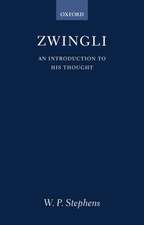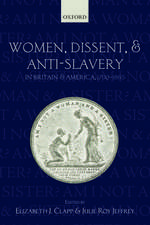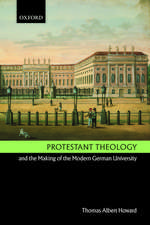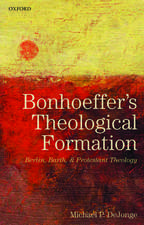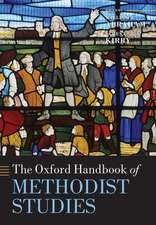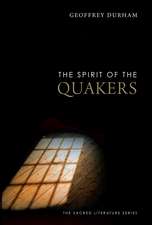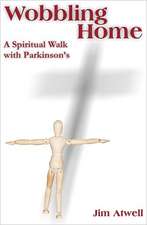The Origins of American Religious Nationalism: Religion in America
Autor Sam Haselbyen Limba Engleză Paperback – 26 ian 2017
| Toate formatele și edițiile | Preț | Express |
|---|---|---|
| Paperback (1) | 255.54 lei 31-37 zile | |
| Oxford University Press – 26 ian 2017 | 255.54 lei 31-37 zile | |
| Hardback (1) | 570.60 lei 10-16 zile | |
| Oxford University Press – 14 mai 2015 | 570.60 lei 10-16 zile |
Din seria Religion in America
-
 Preț: 279.36 lei
Preț: 279.36 lei - 25%
 Preț: 570.60 lei
Preț: 570.60 lei - 30%
 Preț: 658.92 lei
Preț: 658.92 lei -
 Preț: 240.99 lei
Preț: 240.99 lei - 30%
 Preț: 575.58 lei
Preț: 575.58 lei - 30%
 Preț: 500.65 lei
Preț: 500.65 lei - 31%
 Preț: 861.48 lei
Preț: 861.48 lei - 17%
 Preț: 219.86 lei
Preț: 219.86 lei - 19%
 Preț: 460.83 lei
Preț: 460.83 lei - 34%
 Preț: 1068.59 lei
Preț: 1068.59 lei - 35%
 Preț: 199.03 lei
Preț: 199.03 lei -
 Preț: 334.77 lei
Preț: 334.77 lei - 18%
 Preț: 343.58 lei
Preț: 343.58 lei - 31%
 Preț: 891.68 lei
Preț: 891.68 lei - 19%
 Preț: 234.16 lei
Preț: 234.16 lei - 28%
 Preț: 449.35 lei
Preț: 449.35 lei - 38%
 Preț: 236.57 lei
Preț: 236.57 lei - 27%
 Preț: 334.15 lei
Preț: 334.15 lei - 31%
 Preț: 859.44 lei
Preț: 859.44 lei - 30%
 Preț: 687.17 lei
Preț: 687.17 lei - 12%
 Preț: 344.58 lei
Preț: 344.58 lei - 30%
 Preț: 670.28 lei
Preț: 670.28 lei -
 Preț: 241.08 lei
Preț: 241.08 lei - 30%
 Preț: 659.03 lei
Preț: 659.03 lei - 28%
 Preț: 492.60 lei
Preț: 492.60 lei - 22%
 Preț: 520.16 lei
Preț: 520.16 lei - 19%
 Preț: 256.48 lei
Preț: 256.48 lei - 31%
 Preț: 230.98 lei
Preț: 230.98 lei - 31%
 Preț: 906.13 lei
Preț: 906.13 lei - 27%
 Preț: 419.77 lei
Preț: 419.77 lei - 26%
 Preț: 922.64 lei
Preț: 922.64 lei - 22%
 Preț: 183.54 lei
Preț: 183.54 lei - 28%
 Preț: 443.45 lei
Preț: 443.45 lei - 30%
 Preț: 597.63 lei
Preț: 597.63 lei - 30%
 Preț: 506.13 lei
Preț: 506.13 lei - 27%
 Preț: 358.76 lei
Preț: 358.76 lei - 45%
 Preț: 340.45 lei
Preț: 340.45 lei - 28%
 Preț: 419.34 lei
Preț: 419.34 lei - 30%
 Preț: 536.34 lei
Preț: 536.34 lei - 30%
 Preț: 789.22 lei
Preț: 789.22 lei - 28%
 Preț: 422.10 lei
Preț: 422.10 lei - 30%
 Preț: 581.81 lei
Preț: 581.81 lei -
 Preț: 280.53 lei
Preț: 280.53 lei - 31%
 Preț: 876.49 lei
Preț: 876.49 lei - 30%
 Preț: 759.35 lei
Preț: 759.35 lei - 30%
 Preț: 789.06 lei
Preț: 789.06 lei
Preț: 255.54 lei
Preț vechi: 294.68 lei
-13% Nou
Puncte Express: 383
Preț estimativ în valută:
48.90€ • 50.87$ • 40.37£
48.90€ • 50.87$ • 40.37£
Carte tipărită la comandă
Livrare economică 03-09 aprilie
Preluare comenzi: 021 569.72.76
Specificații
ISBN-13: 9780190630089
ISBN-10: 0190630086
Pagini: 352
Dimensiuni: 155 x 231 x 23 mm
Greutate: 0.52 kg
Editura: Oxford University Press
Colecția OUP USA
Seria Religion in America
Locul publicării:New York, United States
ISBN-10: 0190630086
Pagini: 352
Dimensiuni: 155 x 231 x 23 mm
Greutate: 0.52 kg
Editura: Oxford University Press
Colecția OUP USA
Seria Religion in America
Locul publicării:New York, United States
Recenzii
ambitious and thought-provoking book that challenges common understandings of the earliest stages of American nationalism.
Haselby's elaboration of the meaningful conflict between popular frontier evangelicalism and the elite, northeastern missionizing establishment is an important contribution.
His research is meticulous, and the argument is compelling...In Haselby's careful hands... [Andrew] Jackson represents... a new Protestant nationalism that would conquer the West and soon to rise to imperialist notions of manifest destiny.
The Origins of American Nationalism is a thoughtful book. It will spur further research on regionalism, nationalism, frontier religion, and northeastern missions efforts.
A historian's history executed with tremendous concrete specificity about the gradual emergence of American national identity.
[A] very fine, fresh reinterpretation...of protestant and kindred movements across the fast growing new nation... it recalls other sweeping narratives... a subtitle of 'an intellectual history'...would describe well the richness of his assessment. This is a very important and readable volume.
The Origins of American Religious Nationalism is an important contribution... it shows that westward expansion was not merely the logical result of nationalist ideas held by people such as Jefferson but...[that it] transformed nationalist thought in fundamental ways. Most importantly, it demonstrates that the religious and political histories of America's early Republic are best understood in tandem.
[An] impressive and powerfully argued book [showing]... that in the decades following the American Revolution it was American Protestantism and not any sort of classical republicanism that was most important in shaping the development of American nationalism.... Haselby's argument... has a convincing power. He brings together so many loose ends and ties them up in such a neat package that the reader cannot help being persuaded to accept it whole... he has written a book to be reckoned with.
Like the works of [Perry] Miller, [Sacvan] Bercovitch, and others in their tradition, The Origins of American Religious Nationalism traces the geneses of a set of ideas, a way of thinking. Unlike those authors, Haselby writes in a precise and restrained scope, and... recognizes that discourse about 'origins' itself is a particular sort of political strategy and, indeed, at the same time a component of the ideology he is tracing. There are lots of books about religion, politics, missions, and nationalism in the early American republic. Haselby's is the best one.
The Origins of American Religious Nationalism defies easy categorization. This is a clear asset: by blurring...old lines of debate, Haselby invites the historical community to reimagine the religious and intersectional struggles that quickly followed upon American independence....Origins of American Religious Nationalism provides a new narrative of faith and nationhood that will likely earn it a place on future graduate reading lists and further stimulate engagement with American Protestant history.
...[A] provocative study...
In this revelatory narrative, contrasting the competing visions of itinerant frontier preachers and institutionally-based New England evangelicals, Haselby brilliantly illuminates flashpoints of political as well as religious history. While tracking the progress of American Protestantism toward nondenominationalism and missionary enterprise, he tells a suspenseful political story deeply interwoven with the success of nationalism and dynamically rife with sectional and class tensions.
This book provides a fresh, creative, and persuasive account of religion in the early American republic and the relation of religious movements to national politics. It is particularly good on the fierce competition that developed between populist revivalists on the frontier and nationally-minded Christian leaders on the eastern seaboard-and on how that competition led eventually to the national acceptance of slavery. This study is particularly important for charting the impact of religion on politics and vice versa."
This important book explains how the early United States became a battleground for competing visions of Protestant Christianity. Through incisive analysis of the separation of church and state, competition for souls on the frontier, and the rise of evangelical missions, Sam Haselby shows that the question is not if America was originally a Christian nation, but if it was a nation at all, and whose Christianity would rule."
Although Haselbys story is most relevant to nineteenth-century U.S. history, the legacy of his story again with Trump in mind is far from finished ... Haselby may hold the key to explaining what so far has escaped most scholars and pundits who are still scratching their heads about the 2016 presidential contest namely, Trumps appeal to evangelical voters for whom his flagrant flaunting of Christian morality should be repugnant.
Haselby's elaboration of the meaningful conflict between popular frontier evangelicalism and the elite, northeastern missionizing establishment is an important contribution.
His research is meticulous, and the argument is compelling...In Haselby's careful hands... [Andrew] Jackson represents... a new Protestant nationalism that would conquer the West and soon to rise to imperialist notions of manifest destiny.
The Origins of American Nationalism is a thoughtful book. It will spur further research on regionalism, nationalism, frontier religion, and northeastern missions efforts.
A historian's history executed with tremendous concrete specificity about the gradual emergence of American national identity.
[A] very fine, fresh reinterpretation...of protestant and kindred movements across the fast growing new nation... it recalls other sweeping narratives... a subtitle of 'an intellectual history'...would describe well the richness of his assessment. This is a very important and readable volume.
The Origins of American Religious Nationalism is an important contribution... it shows that westward expansion was not merely the logical result of nationalist ideas held by people such as Jefferson but...[that it] transformed nationalist thought in fundamental ways. Most importantly, it demonstrates that the religious and political histories of America's early Republic are best understood in tandem.
[An] impressive and powerfully argued book [showing]... that in the decades following the American Revolution it was American Protestantism and not any sort of classical republicanism that was most important in shaping the development of American nationalism.... Haselby's argument... has a convincing power. He brings together so many loose ends and ties them up in such a neat package that the reader cannot help being persuaded to accept it whole... he has written a book to be reckoned with.
Like the works of [Perry] Miller, [Sacvan] Bercovitch, and others in their tradition, The Origins of American Religious Nationalism traces the geneses of a set of ideas, a way of thinking. Unlike those authors, Haselby writes in a precise and restrained scope, and... recognizes that discourse about 'origins' itself is a particular sort of political strategy and, indeed, at the same time a component of the ideology he is tracing. There are lots of books about religion, politics, missions, and nationalism in the early American republic. Haselby's is the best one.
The Origins of American Religious Nationalism defies easy categorization. This is a clear asset: by blurring...old lines of debate, Haselby invites the historical community to reimagine the religious and intersectional struggles that quickly followed upon American independence....Origins of American Religious Nationalism provides a new narrative of faith and nationhood that will likely earn it a place on future graduate reading lists and further stimulate engagement with American Protestant history.
...[A] provocative study...
In this revelatory narrative, contrasting the competing visions of itinerant frontier preachers and institutionally-based New England evangelicals, Haselby brilliantly illuminates flashpoints of political as well as religious history. While tracking the progress of American Protestantism toward nondenominationalism and missionary enterprise, he tells a suspenseful political story deeply interwoven with the success of nationalism and dynamically rife with sectional and class tensions.
This book provides a fresh, creative, and persuasive account of religion in the early American republic and the relation of religious movements to national politics. It is particularly good on the fierce competition that developed between populist revivalists on the frontier and nationally-minded Christian leaders on the eastern seaboard-and on how that competition led eventually to the national acceptance of slavery. This study is particularly important for charting the impact of religion on politics and vice versa."
This important book explains how the early United States became a battleground for competing visions of Protestant Christianity. Through incisive analysis of the separation of church and state, competition for souls on the frontier, and the rise of evangelical missions, Sam Haselby shows that the question is not if America was originally a Christian nation, but if it was a nation at all, and whose Christianity would rule."
Although Haselbys story is most relevant to nineteenth-century U.S. history, the legacy of his story again with Trump in mind is far from finished ... Haselby may hold the key to explaining what so far has escaped most scholars and pundits who are still scratching their heads about the 2016 presidential contest namely, Trumps appeal to evangelical voters for whom his flagrant flaunting of Christian morality should be repugnant.
Notă biografică
Sam Haselby is a historian of religion and American political culture. He earned his PhD at Columbia University, was a Junior Fellow at the Harvard Society of Fellows, and has been a faculty member at the American University of Beirut and the American University in Cairo. His writings on U.S. politics and religion in historical perspective have appeared in The International Herald Tribune, The Boston Globe, and The Guardian. He is working on a book about the opium trade. Currently, he is a visiting faculty member at Columbia University.

